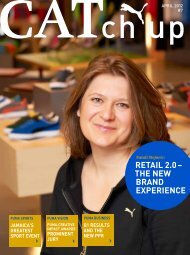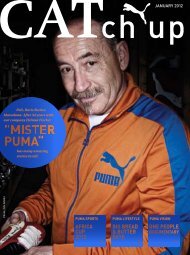PDF Download - Puma-catchup.com
PDF Download - Puma-catchup.com
PDF Download - Puma-catchup.com
Create successful ePaper yourself
Turn your PDF publications into a flip-book with our unique Google optimized e-Paper software.
P_44 CAtch up | # 02_April 2013<br />
Vision<br />
P _45<br />
As PUMA continues on its road to be<strong>com</strong>ing<br />
more sustainable, CATch up looks<br />
at how the FairTrade<br />
IS FAIRTRADE FEASIBLE?<br />
Making and selling products that balance<br />
people, planet and profit is difficult, but<br />
PUMA’s pledge to sustainability gives it<br />
unique brand advantage among its rivals.<br />
Can FairTrade help seal the deal?<br />
Putting a price tag on its environmental<br />
impact and being serious about reducing<br />
its paw print have made PUMA an eco pioneer<br />
among big corporations but capitalizing<br />
on this success is still an uphill<br />
battle, as recent experience shows.<br />
On top of this, proving a <strong>com</strong>pany’s eco<br />
credentials is tough. Studies show only<br />
16 percent of customers believe what<br />
corporations tell them. So certification<br />
from an independent third party is the<br />
best way to verify a product’s social and<br />
environmental claims.<br />
concept can help<br />
The value equation at present seems to<br />
suggest not, at least in some countries.<br />
Consumers in South Africa would be happy<br />
to pay around 10-15 percent more for<br />
a FairTrade clothing product, said Collin<br />
Allin, PUMA Performance Sport Manager<br />
in Cape Town.<br />
Fair Trade Tee from<br />
the Wilderness Collection.<br />
“Being the first to measure environmental<br />
profit and loss is a great coup for the<br />
<strong>com</strong>pany … and gives PUMA a huge lead<br />
against its <strong>com</strong>petitors,” wrote Anna<br />
Levy, who specializes in building and facilitating<br />
networks for change at The Hub<br />
in London.<br />
But she acknowledges that today’s profit-driven<br />
culture still makes sustainability<br />
an “add on bonus” rather than a central<br />
influence on behaviour, even though<br />
people know that unsustainable development<br />
puts us all at risk in the long term.<br />
GREEN GUARANTEE<br />
Enter FairTrade, an organisation that has<br />
set sustainability standards, branded<br />
them and underpins them with a seal. It<br />
is the most widely recognized eco label in<br />
the world, according to opinion research<br />
consultancy GlobeScan.<br />
FairTrade coffee, the organisation’s poster<br />
child, is a resounding <strong>com</strong>mercial success<br />
with its UK sales booming almost<br />
1,000 percent over the last five years. But<br />
does the approach work for apparel and<br />
shoes?<br />
But anecdotal evidence suggests that<br />
the mark up in South Africa is much<br />
more. “(It’s) 50 percent we’re seeing with<br />
FairTrade in South Africa now,” said a<br />
South African PUMA employee, pointing<br />
to sales of PUMA’s Wilderness Collection,<br />
which uses over 80 percent Fair-<br />
Trade cotton in its styles.<br />
FairTrade goods are more expensive because<br />
the organization guarantees to pay<br />
farmers a minimum price above market<br />
rates. On top, it pays a “FairTrade premium”<br />
that can be reinvested by farmers >











